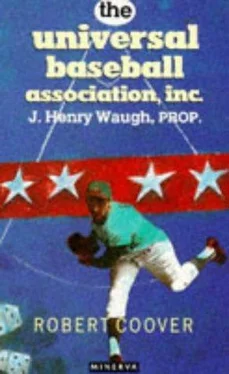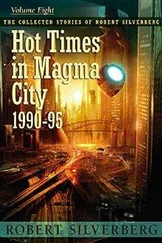Robert Coover - The Universal Baseball Association, Inc., J. Henry Waugh, Prop
Здесь есть возможность читать онлайн «Robert Coover - The Universal Baseball Association, Inc., J. Henry Waugh, Prop» весь текст электронной книги совершенно бесплатно (целиком полную версию без сокращений). В некоторых случаях можно слушать аудио, скачать через торрент в формате fb2 и присутствует краткое содержание. Год выпуска: 1992, Издательство: Minerva, Жанр: Современная проза, на английском языке. Описание произведения, (предисловие) а так же отзывы посетителей доступны на портале библиотеки ЛибКат.
- Название:The Universal Baseball Association, Inc., J. Henry Waugh, Prop
- Автор:
- Издательство:Minerva
- Жанр:
- Год:1992
- ISBN:нет данных
- Рейтинг книги:3 / 5. Голосов: 1
-
Избранное:Добавить в избранное
- Отзывы:
-
Ваша оценка:
- 60
- 1
- 2
- 3
- 4
- 5
The Universal Baseball Association, Inc., J. Henry Waugh, Prop: краткое содержание, описание и аннотация
Предлагаем к чтению аннотацию, описание, краткое содержание или предисловие (зависит от того, что написал сам автор книги «The Universal Baseball Association, Inc., J. Henry Waugh, Prop»). Если вы не нашли необходимую информацию о книге — напишите в комментариях, мы постараемся отыскать её.
The Universal Baseball Association, Inc., J. Henry Waugh, Prop — читать онлайн бесплатно полную книгу (весь текст) целиком
Ниже представлен текст книги, разбитый по страницам. Система сохранения места последней прочитанной страницы, позволяет с удобством читать онлайн бесплатно книгу «The Universal Baseball Association, Inc., J. Henry Waugh, Prop», без необходимости каждый раз заново искать на чём Вы остановились. Поставьте закладку, и сможете в любой момент перейти на страницу, на которой закончили чтение.
Интервал:
Закладка:
base,
And this guy gits a hit and comes and stands on
my face!
PLAY BALL! (I'm gonna split if it's all the
same!)
PLAY BALL! (What the hell is the name of
this game?)
PLAY BALL!
"All right. Where were you this morning, Mr. Waugh?'* Just when he least expected him, there he was: Horace Zifferblatt.
And what could he say? Playing baseball between the sheets with a B-girl? Celebrating Damon's Day in the UBA? He smiled. Looking more carefully now at his work, he saw that he had entered a whole list of figures in the wrong column. In pencil, fortunately. Zifferblatt reared before him, fidgeting in a cold yet incensed quiver, thumbs rammed into the snake-skin belt of his black-and-gray striped trousers, his third and grayest chin beetling neatly over the hard knot of his purple-and-cream tie. Henry knew he should wait until the man had gone, but he didn't. He got out his eraser and went to work.
"Is something wrong , Henry?" The shift in name was not necessarily a good sign. Ziff, he knew, was watching him erase.
Henry had to admit that the more carefully he figured the percentages and tabulated the records of his Association, the more mistakes he seemed to make here at work, and though he knew he shouldn't really be bothered by the fact, nevertheless he still suffered from that professional pride of computational infallibility, and so no doubt he was blushing now. He brushed eraser crumbs from the ruled paper and surveyed his work. He supposed that the whole office was watching them now, but he really didn't know what to tell Ziff. He saw Damon Rutherford down in the locker room, one foot up on a bench, lacing a cleated shoe, saw him feel a foreign presence, saw him straighten up, tall, lithe, self-composed, a look of amusement commingled with compassion arching his young brow, saw him turn to look down on this little fat man, standing there in confused rage, heard him say: "How's that, fella?"
Zifferblatt rocked back on his heels, blew out his cheeks in genuine astonishment. "Waugh!" he squeaked. "I want you to come in and see me first thing tomorrow morning— first thing ! You hear?" The man rotated, and head bulled forward, stumped off to his private office. Henry watched him, then returned to his books. Lou dropped by cautiously, but Henry waved him off; couldn't Lou see he really didn't care?
He transcribed the misplaced figures into the right column, but once that was done, he couldn't seem to keep going. His mind kept drifting back to his kitchen table. Big night tonight. He still had to post all the action of the forty-seventh games, then write it up in the Book. Plenty to talk about. Terrific pennant chase developing between the Knickerbockers and the Pioneers, with the Pastimers and last year's champs, the Keystones, not far behind. Patrick Monday's new political party. Though, with Damon's no-hitter, he was less excited about that now; it seemed less necessary. Still, the seed was sown. Monday probably fretting about the new league mood. Wait and see. Also there was the developing slugging contest between the Knicks' Walt McCamish and die Pioneers' Witness York. Signs of a new Rutherford Era. What a season! The big story tonight, of course, was the perfect game. The boy with the magic arm. The man who knows himself. Phrases and headlines floated through his mind. Return of the Pioneers. Hopes soar for first pennant in twenty-four years. Have to remember that interview with Barney Bancroft he had in bed this morning. What about Damon's consecratory romp in the sack afterwards? Sure, why not? Somebody's virgin daughter. Maybe the Knicks' manager Sycamore Flynn had a daughter he could use. Only one? Hell, a whole stadium full! Line 'em up! Boy with the magic shortarm!
What was he doing here? He had to get out, get home! He looked at the clock: 4:21. Couldn't even wait nine minutes? Couldn't he play the horseracing game he kept in his desk drawer, for instance? He couldn't. He glanced toward Zifferblatt's office: bent over the books. Well, it would be a hard pill for the old man to swallow, but that was tough. Henry closed the books, put them away, stepped over to the hat-tree for his gray felt, raincoat, and black umbrella, and left the office. On the move. Come on, boys, let's take the field. Lot of pepper now. As he passed Ziff's office, he caught a glimpse of the old man's gray head jerking up to glare at his early exit. Well, too bad, but how could anyone take seriously, after all, a man named Horace Zifferblatt? Once in the elevator, going down, he was able to forget about work altogether. He was headed for home, returning to his league and all its players, to the Book and tonight's big story, and there weren't any Horace Zifferblatts there.
Outside, it was raining again, nostalgic fall evening, and Henry, as he stepped along under his umbrella, found it pleasant to muse about the origins. He'd always played a lot of games: baseball, basketball, different card games, war and finance games, horseracing, football, and so on, all on paper of course. Once, he'd got involved in a tabletop war-games club, played by mail, with mutual defense pacts, munition sales, secret agents, and even assassinations, but the inability of the other players to detach themselves from their narrow-minded historical preconceptions depressed Henry. Anything more complex than a normalized two-person zero-sum game was beyond them. Henry had invented for them a variation on Monopoly, using twelve, sixteen, or twenty-four boards at once and an unlimited number of players, which opened up the possibility of wars run by industrial giants with investments on several boards at once, the buying off of whole governments, the emergence of international communications and utilities barons, strikes and rebellions by the slumdwellers between "Go" and "Jail," revolutionary subversion and sabotage with sympathetic ties across the boards, the creation of international regulatory bodies by the established power cliques, and yet without losing any of the basic features of their own battle games, but it never caught on. He even introduced health, sex, religious, and character variables, but that made even less of a hit, though he did manage, before leaving the club, to get a couple pieces on his "Intermonop" game published in some of the club literature.
And so, finally, he'd found his way back to baseball. Nothing like it really. Not the actual game so much — to tell the truth, real baseball bored him — but rather the records, the statistics, the peculiar balances between individual and team, offense and defense, strategy and luck, accident and pattern, power and intelligence. And no other activity in the world had so precise and comprehensive a history, so specific an ethic, and at the same time, strange as it seemed, so much ultimate mystery. He had started out by selecting eight teams from baseball's early days in the Civil War and Reconstruction eras, and supplying them with rosters of twenty-one ballplayers each. Marshall Williams. Verne Mackenzie. Fancy Dan Casey. Barnaby North. How clearly he remembered the stars of that first year! He even recalled the precise results of those first games, how the Beaneaters won their first six games in a row and never gave up the lead, beating out the Keystones by five full games. If he tried hard enough, he could probably even remember the exact scores.
Of course, the abrupt beginning had its disadvantages. It was, in a sense, too arbitrary, too inexplicable. In spite of the almost excessive warmth he felt toward those first ballplayers, it always troubled him that their life histories were so unavailable to him: What had a great player already in his thirties been doing for the previous ten years? It was much better once a kind of continuity had been established, and when new players had taken over the league who had their whole careers still ahead of them. It was, in fact, when the last Year I player had retired that Henry felt the Association had come of age, and when, a couple years ago, the last veteran of Year I, old ex-Chancellor Barnaby North, had died, he had felt an odd sense of relief: the touch with the deep past was now purely "historic," its ambiguity only natural. Luckily, all the first-year records had been broken. And soon there would be no more living veterans born before Year I.
Читать дальшеИнтервал:
Закладка:
Похожие книги на «The Universal Baseball Association, Inc., J. Henry Waugh, Prop»
Представляем Вашему вниманию похожие книги на «The Universal Baseball Association, Inc., J. Henry Waugh, Prop» списком для выбора. Мы отобрали схожую по названию и смыслу литературу в надежде предоставить читателям больше вариантов отыскать новые, интересные, ещё непрочитанные произведения.
Обсуждение, отзывы о книге «The Universal Baseball Association, Inc., J. Henry Waugh, Prop» и просто собственные мнения читателей. Оставьте ваши комментарии, напишите, что Вы думаете о произведении, его смысле или главных героях. Укажите что конкретно понравилось, а что нет, и почему Вы так считаете.












